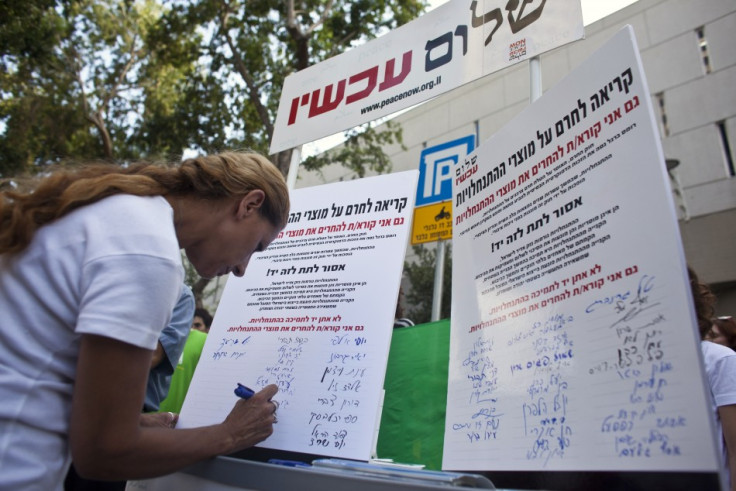Is Netanyahu Losing Support in Israel?

The Israeli parliament has passed a controversial law that will punish any Israeli individual or organisation boycotting West Bank settlements.
After failed attempts to delay the debate, it was voted through 47-36 on Monday.
The law was voted through after several Israeli calls to boycott institutions or individuals linked to Jewish settlements on disputed land.
The settlements are one of the most contentious issues of the Israeli-Palestinian conflict and recent peace talks with the Palestinians were once again derailed after Israel said it would continue building in settlements, while Palestinians, on the other hand, want the West Bank as part of a future state.
Despite being deemed illegal under international law, Israel continues to insist the settlements are a necessity whilst denying their illegitimacy.
While the government pursues its settlement policies, a large group made up of Israeli academics and artists called for the boycott of the West Bank settlement of Ariel, and rapidly gained popularity which angered both the settlers and the authorities.
Israeli developers also agreed not to use products or services from settlements when they signed on to help build a new modern Palestinian city, north of Ramallah.
Under the new law those who sponsor a "geographically based boycott" - which includes any part of the Jewish state or its settlements - could be sued for damages in a civil court by the party injured in the boycott call.
The petitioner is not required to prove that "economic, cultural or academic damage" was caused, only that it could reasonably be expected from the move.
"The State of Israel has for years been dealing with boycotts from Arab nations, but now we are talking about a home-grown boycott," said the author of the legislation, lawmaker, Zeev Elvin, the Associated Press news agency reported.
"It is time to put an end to this travesty. If the State of Israel does not protect itself, we will have no moral right to ask our allies for protection from such boycotts."
The law was highly criticised by rights groups who say the legislation stifles freedom of speech and compromises Israeli democracy and a number of Israeli activists have campaigned against the bill
The Association for Civil Rights in Israel (Acri) described it as "deeply anti-democratic" and a violation of Israelis' freedom of speech.
"There is no question that promoting boycotts is a legitimate, democratic, non-violent form of protest that is being used by Israelis on a wide variety of issues from environmental issues to opposing the prices of certain products," said ACRI executive director, Hagai el-Ad.
"No reasoning has been suggested to explain why the boycott of settlement goods should be uniquely cherished as opposed to the right of the Israeli citizen to protest."
On Sunday, activists opposed to the boycott ban held a noisy demonstration outside the Justice Ministry. They carried banners which read "the boycott law boycotts democracy."
Also the group Boycott! Supporting the Palestinian BDS (boycott, divestment and sanctions) Call from Within, also issued a statement:
"We, Israeli citizens, members of Boycott!, hereby reiterate our support and promotion of the Palestinian Call for Boycott, Divestment and Sanctions against Israel, until it complies with international law and universal principles of human rights. We declare this in spite of the new legislation by the Israeli Knesset, which aims to penalize our and our partners' activities, curbing freedom of speech and political organizing and most importantly - banning Israeli citizens from acting according to their conscience when it conflicts with the deplorable policies of the state."
The organisation also called for artists to challenge the new law:
"Lastly, we urge artists scheduled to perform in Israel to send a clear message that the Israeli occupation, the institutionalized discrimination of Israel's own Palestinian citizens and Israel's denial of the right of return and compensation of the Palestinian refugees - are neither okay nor normal, as Maxi Jazz from Faithless once put it. Roxette, Ziggy Marley, Dream Theater, George Benson, Nino Katamadze, Paul Simon and John Cale - we may risk persecution for saying this - heed the Palestinian call for BDS and cancel your shows in Israel!"
American Jewish organizations have also joined in and while many insist they do not support boycotts, they nonetheless are against the law.
Rabbi Steve Gutow, director of the Jewish Council for Public Affairs, the umbrella body for the Jewish public policy groups, told the press "We're disappointed that they passed the law," "We don't support boycotts... The law does challenge democracy in a way, and hopefully the Supreme Court will respond."
Morton Klein, president of the Zionist Organization of America, said he was still studying the legislation, but that in principle the ZOA opposed anti-boycott laws.
"Nobody was more appalled by the boycott of Ariel Theatre than me, but to make it illegal? I don't think so," Klein told JTA.
The high court will now have to decide whether or not the law should enter into force.
© Copyright IBTimes 2024. All rights reserved.





















